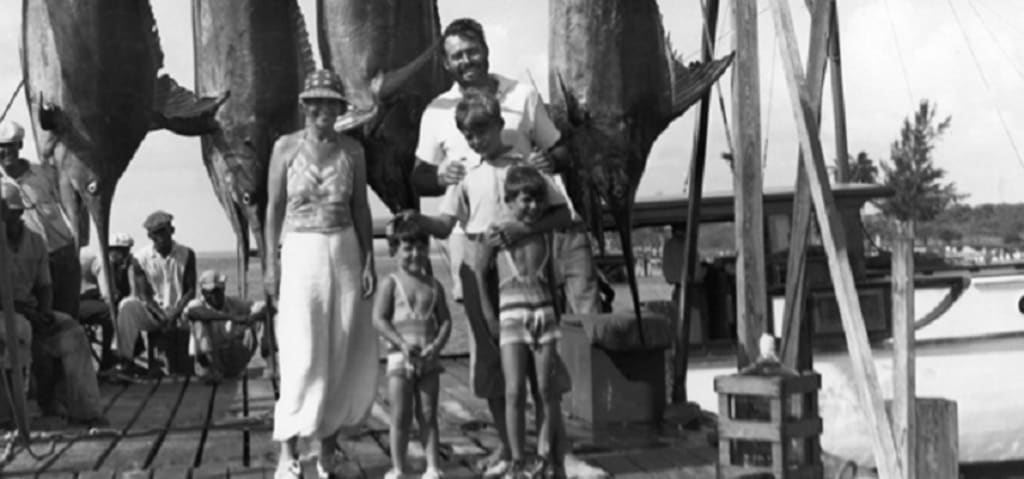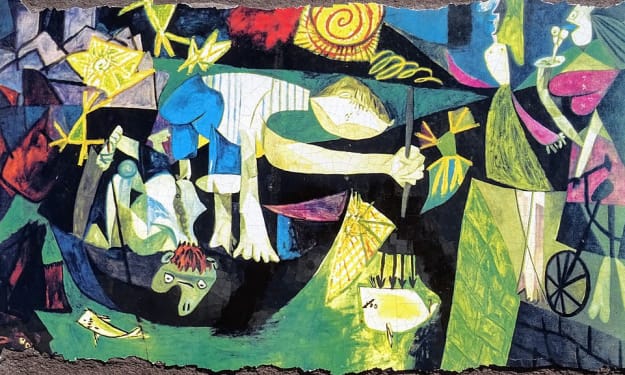How to write a story in 100 words (or less)
Read this before submitting your Microfiction Magic challenge entry

Urban myth has it that Ernest Hemmingway wrote a complete story in six words for a bet:
For sale, baby shoes, never worn.
Maybe he did, maybe not, but certainly those six words tell a powerful and tragic story. But with only six words, it’s hard to write a beginning, a middle and an ending. Hemmingway’s story was just the ending, with a four-word beginning. No middle.
For the Microfiction Magic challenge, on the other hand, you get a full 100 words to play with, which is more than enough for a powerful and captivating start, an engaging middle, and a big pay-off at the end. Writing flash fiction is a great way to hone your skills as an author. It helps you to choose words that convey meaning with economy, accuracy, and authenticity. It also helps practice the art of creating a story, characters, dialogue and dramatic action out of nothing. Not least, it helps you with that all-important, uncompromising ruthless edit.
Taking time out for a little microfiction writing can also help to solve those tricky problems you are having with your work in progress. Give it a go and you may find that the “writer’s block” you keep talking about just melts away. Really! Give it a try.
If you need any help getting started, here are a few suggestions.
If you are having trouble coming up with an idea for your story, try the three Rs: Research, Research, Research. First, try researching a few key words that relate to your story idea. If you have no idea to start with, just choose a few words at random. Try delving into some historical research or factual background around your trigger words. Then perhaps try researching some character names. Great thing is, you can do it all with Google and Wikipedia, extending the search out to other resources as necessary. Not just for information, but also for inspiration. The idea for a story seldom just jumps into a writer’s imagination. You have to find a way to light the fire, whether by listening to some music, going for a walk, or diving into your favorite book.
Agatha Christie was said to have come up with her best ideas doing the washing up or going for a walk on the Devon moors. I have tried both and they both work, although you don’t need the wild open spaces of Dartmoor. Any outdoor space will do, for an inspiring walk through nature. I often come up with ideas listening to music. For example, the Leonard Cohen song “Hey, That's No Way to Say Goodbye,” has a line “Your hair upon the pillow like a sleepy golden storm.” I once wrote a story after listening to this song late one night. The 100-word story I created, picks up the narrative of the love lost from the song, as well as the overall down-beat mood of this and Cohen’s other music. Thanks to the song, I was able to think of a beginning and an ending and just had to fill in the gap to have written a story. Using this method, the job of writing the story was quick and easy. All I needed the song for was a little inspiration.
Take another example. I was given the prompt word “coffee” for a 100-word story. You can see the finished product here
How did I make a start on a story about coffee? My first thought was about the history of coffee. I knew that coffee was a drink brought to the world by Arab traders. I knew little more. A few minutes’ research told me more than I needed to know for a simple story. It also gave me names of various individuals in the 15th century, thought to have been influential in the spread of coffee drinking.
All I had to do to get my characters’ names, was to pick two that I liked the sound of from the historical references (mostly Wikipedia). Ahmed al-Ghaffar from the Yemen, himself a storyteller, and Sheikh Omar, who had been exiled from Mocha and spent some time living in a cave. The fact that he was an outcast was perhaps a story in itself.
I spent about 20 minutes in total going through names, places, dates and clicking through the various myths and legends about coffee. This was no chore as I have always enjoyed historical research and there was plenty of material. I then dreamt up a story about a traveller who is offered his first cup of coffee, one cold and lonely night. This tale in the making already had the ring of cowboys and campfires about it, so I stuck with it. Other times I think of a story, but it doesn’t work so well. When that happens, I try something else instead.
All I had to do then was to write the story. When I write a microfiction with a word limit as low as 100 words, I don’t worry too much about word count to start with. I tend to think of the ending first and then the beginning, which makes the writing of the middle a simple exercise in joining up the dots.
Having found two characters that interested me, I wanted them to be big enough to speak for themselves, so tried to think of what they might say to each other in a chance meeting.
I knew very little about al-Ghaffar, but I made him a merchant in my story, traveling across a lonely mountain road in the dark on a stallion. I used “stallion” rather than “horse” because the word tells us so much more and paints a much brighter picture. Not just any old horse, not a workaday mare, and certainly not a gelding. Why? Because our MC has wealth and status and, perhaps, a certain manliness. A stallion says all these things about him. Traveling by horseback also suggests a time before motorized transport. It could be the 11th century, it could be the 19th century, it doesn’t really matter. It is a time before the kind of technology we take for granted.
The horse picking its way though a treacherous path suggests a difficult journey. If the MC is leaning over the horse and straining to see, it is either night, bad weather or both. The setting and the names suggest the Middle East, which is just enough information. We do not need to know any more.
Already we have a story in the first sentence. A wealthy merchant with a noble sounding name is traveling alone on his horse at night along a difficult route, probably through mountains. How does he feel? Vulnerable to say the least. He could fall prey to any passing robbers who would have no difficulty surprising him on this dark and dismal night.
How does the choice of words tell us all this? The narrative conveys drama by focusing on actions, rather than description. Showing rather than telling. I could have said “It was a cold, dark night and John Smith, a merchant traveling alone, was a bit nervous about the possibility there might be robbers hiding.” Boring! Actions speak louder than words so concentrate on these and the words will fall into place.
My aim (you tell me if I achieved it) was to place the reader on that horse, alone in the cold and dark, expecting armed thieves to pop out of the shadows at any moment. My choice of words was all about atmosphere and building tension. What happens next? A switch in the dramatic tension and a change of pace as Omar appears, someone al-Ghaffar recognizes (“none other than”). Unlike the merchant, Omar would appear to be something of a shady character. He is, it seems, an outcast and there is a question about whether he is really a Sheikh, or the title is just an affectation. All adding to the mystery of the meeting. What on earth does he want and what is he doing here in the middle of nowhere? Hiding in a cave, it seems. Knowing this, adds to the mystery.
If you are wondering, at this point, how to get so much action into so few words, the technique is simplicity itself. You just write it as you think it and then go back and cut out all the padding. You might start with: “Just then, a man called Sheikh Omar appeared from the cave he had been hiding since he was exiled from his home-town of Mocha. Omar was a bit of a shady character.” From this, cut the reference to Mocha, as it adds nothing to the story, leaving you to explain further. “The outcast Skeikh Omar,” tells you his name and suggests the questionable reputation in just four words. “Concealed in a cave,” tells you where he was and what he was doing and casts further doubt on his reputation. You probably could have cut “as he liked to call himself,” but I liked the way it cast further doubt as to Omar’s credentials. Had I found any difficultly in cutting a further five words, they would have gone next. They do, however, help to indicate that al-Ghaffar was inclined to look down upon Omar.
The pecking order is confirmed by Omar, himself, as we launch into dialog. Essential to bring authenticity and animation to any story. A microfiction is no different. Who wants to hear some boring author droning on in a dull monotone, monochrome and clumsy narrative? Let the characters speak for themselves and add their own color.
So, what does Omar say? “Come Effendi, I have something for you.” Use of “Effendi” may well be the wrong language (I’m not sure) but who will notice? Hopefully, the Times literary correspondent, who will tell the readers what an awful story this is – a bad review in the Times would be very welcome, thanks! The word does, however, suggest a doffing of the cap, a deferential “Sir.” What could it possibly be that the outcast wants to show me? …is what al-Ghaffar is perhaps thinking. I might have said that in the draft, but it would have been unnecessary and so could be cut without losing anything. He was obviously interested and, despite any misgivings he might have, ended up in the cave before a fire, as we discover from the action in the next sentence of the narrative. Al-Ghaffar sniffs “the strange, dark liquid” Well, he had clearly never seen it, let alone tasted or sniffed it before, so he wasn’t going to just accept and drink it without wondering what it is. The great thing here is that we, the readers, know what he is about to drink, given the title of the story. Perhaps we even anticipate his reaction and guess what he has to say. Like all mystery writers, I hope the reader does not guess the actual ending. Did you?
All of this is the middle story, the development of the narrative, with its twists and changes of pace. Not many, of course, because the story is so brief. There is, however, plenty of dramatic action. At this point, there is only one thing we need to do in order to have written a complete story – write the ending. That is, if it has not already been written. Did I say I wrote the ending first, then the beginning, then the middle?
For the purposes of this exercise, let’s assume that the ending is still to be written. You have several options. My preferred ending is the unexpected twist. You can, of course, use other types of ending. The happy ending, sad, ironic, funny ending, or whatever you like. As long as it has impact, which usually means that it can’t easily be predicted by the reader. There has to be an element of mystery. It can also help with impact if you tie the ending closely to the beginning. A kind of set-up and then pay off. “David loved ribbons…. Today, he wrapped a blue and gold satin around his and his bride’s wrist, as he said ‘I do.’” This is the beginning and ending of another 100-word story I wrote a while back.
Or, how about “Stepping up to the barn, she took off her beloved crucifix… Peace granted by the silver ball lodged in his heart” ? Please feel free to try writing your own middle story to link these beginnings and endings and please let me know if you submit them to Vocal.
With the coffee microfiction, as with so many that I write, I exceeded the required maximum length of 100 words by a long way. No matter. If you go over the limit, keep writing until you have finished the story. Once you have finished your first draft, cutting the story back to 100 words is half the fun. All you need to do is to take out a word, phrase or sentence and then ask yourself if the story still works without it. If it does, then leave it out. Then try to replace multiple word descriptions with single words. If you can’t think of good words to use, go to any thesaurus, online or in printed volume. That’s what reference books and reference sites are for. These days, having access to the Web makes it all so simple. You will also find that by cutting down on the verbiage, you also prompt yourself to find better words and sharper ways to cut to the action than the words you first chose. I often find that my first draft of a story is about me getting the story down before I forget anything. I am telling myself the story. As I edit and refine and make better choices, I am able to think more about how to tell the story in a way that captivates my reader.
This is how I approach the joyous task of writing a microfiction.
So, why not give it a go and enter the Vocal Microfiction Challenge?
You might find the following ten top tips helpful:
- Anything spring to mind immediately? Any great ideas for a story? Yes? Just write the story, not worrying about the word count just yet.
- Can’t think of anything? Spend 10 minutes thinking up key words and searching for a range of alternative meanings, interpretations, history. Think of a song or another story or go for a walk and keep your eyes peeled for natural inspiration. Doing day-to-day chores that leave you free to think can often help too.
- Try out some one-line ideas.
- Think of some characters’ names, use baby name sites if you need some ideas. Perhaps use names that have meanings that relate to their characters.
- Think about the end of the story. What is the point, the whole moral of the tale? Can you give it a twist in the tail, an unexpected or surprise ending?
- How does the story begin? Set the scene, if possible, in a single short sentence.
- Introduce some dialog, some dramatic interplay between the characters.
- Now go step by step from start to finish.
- Does it work? If not, try something else.
- Last but far from least, the edit. Start by cutting out anything that does not add to the story. Rewrite some of the lengthy descriptions and dialog into shorter, sharper prose. Most descriptions will have more impact if you select fewer, choicer words to convey meaning.
That’s really all there is to it. A great way to have fun and practice tools and techniques that will stand you in good stead for any writing task, from short story or flash fiction to a full-length novel.
Finally, if you are looking for some great advice on how to write flash, I would highly recommend reading Teresa Renton's:
Thanks for reading
About the Creator
Raymond G. Taylor
Author based in Kent, England. A writer of fictional short stories in a wide range of genres, he has been a non-fiction writer since the 1980s. Non-fiction subjects include art, history, technology, business, law, and the human condition.
Reader insights
Outstanding
Excellent work. Looking forward to reading more!
Top insights
On-point and relevant
Writing reflected the title & theme
Easy to read and follow
Well-structured & engaging content
Expert insights and opinions
Arguments were carefully researched and presented
Eye opening
Niche topic & fresh perspectives
Masterful proofreading
Zero grammar & spelling mistakes
Excellent storytelling
Original narrative & well developed characters
Heartfelt and relatable
The story invoked strong personal emotions
Compelling and original writing
Creative use of language & vocab







Comments (19)
This is so genius. How and why had I missed it earlier???
The article discusses the power and potential of microfiction, highlighting the challenge of telling a complete story in a limited word count. It emphasizes the importance of research, inspiration, and the art of choosing words that convey meaning effectively. The author shares their approach to crafting microfiction, using examples and techniques to create atmosphere, build tension, and engage readers. The article encourages writers to try microfiction as a means of overcoming writer's block and honing their skills. https://monkeymart.online/
Interesting and helpful, really grabbed my attention and got me thinking. I would like to read some more from you! You can also create your own blog, if you are interested in development you can bring your attention to some software developing company https://ficustechnologies.com/ Good Luck anyway!
This is a well-written and interesting piece. Well done on having the day's most-read story. Count me in! https://geometrydashsubzero.net
Nicely written and thorough description of your micro-creative process. We find the pruning to be the fun part, then the word tuning (for sound and different connotations). It's a lot like poetry, these microfiction challenges💙Anneliese
This was very informative and well written! Congratulations on your Top Story! I've subscribed!
Excellent work , we have shared this in Vocal Social Society on Facebook if you would like to join us there
That Ernest Hemmingway story struck me as hard hitting. I immediately thought of several sad instances for the reason being they were "never worn." Then my brain being what it is tried to find and reach out for several happy reasons. For instance: "initially too small" or "born too large," "boxed and forgotten," "minimalists' lifestyle," etc. Like, instead of the dark foreboding thoughts of death, I tried to think of more casual causes. Thus, is the interpretation of the audience. One of the things I did recently was base a few micros off of the pictures selected at sheer random from the Unsplash search engine. Then I had friends select pictures, and then I had my friends select pictures and even provide me with a starter sentence. One friend took it a bit too far and I was sweating bullets that he was going to have the starting sentence be 98 words. I read an article on Toastmasters today and it talked about how the person doing the selling should make the client the hero, while the seller is the mentor. The mentor isn't capable, but the client is. Sure, storytelling is important and great about making things heartfelt, however if the narrator makes the story about oneself, the audience can tend to check out. Sometimes using the word "I" in the story makes the audience think that it's the author or narrator. Audience incorporation can make a huge difference. Also, now it makes sense why Vocal published several stories with 400 prompts.
Congratulations on Top Story!
Very insightful, The Story of Hemmingway was worth the read, (True or not) Congratulations
This is a great analysis of the form and how to get things done. I have collected a lot of ideas for a book, but the micro-literature form is coming fast and hot without a line on a page. Guess I have to turn thing around... Thank you, sir!
This was very helpful. Thank you for taking the time to put it together and share. Now, time to go edit one haven’t published yet. I enjoyed Coffee as well.
Very helpful. Thank you
Great article and super helpful insights! Thank you for writing, Raymond!
This is very helpful. There have been some excellent stories in this micro challenge. thank you for your insight and congrats on the top story
Very helpful insights - I like your commitment to 100 word projects.
This is great 😁 I notice that lots of microfiction stories are beginnings, or endings, or synopses... and not self-contained stories in their own right. 🤔 I don't think many of mine make the grade, but it's fine to try. It all keeps the cogs oiled and turning 😁
I enjoyed reading this. Interesting and inspiring.
I'm not going to lie. At first I thought you wrote a micro fiction about how to write a micro fiction. Then I saw it was a 13 minute read. Excellent tips to help us writers along!